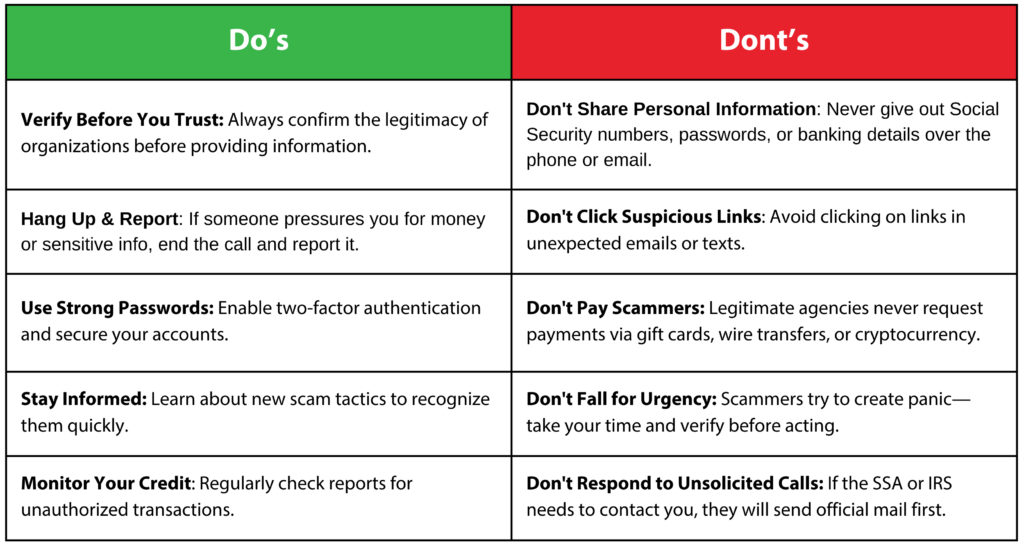National Slam the Scam Day: Protect Yourself from Fraud on March 7
Every year on March 7, the United States observes National Slam the Scam Day. A day dedicated to raising awareness about scams and empowering people to protect themselves from fraudulent schemes. The Social Security Administration (SSA) and the Federal Trade Commission (FTC) goal aims to educate the public on recognizing and avoiding scams.
National Slam the Scam Day Origin
National Slam the Scam Day was established in 2020 by the Federal Trade Commission as part of its ongoing efforts to combat the increasing threat of scams in the country. The Social Security Administration later joined the initiative to raise awareness about scams that specifically target Social Security beneficiaries.
The day is not just about educating individuals but also empowering communities. We are going to go over the most common type of scams, how to recognise them, and what to do when you encounter a scam.

How Scams Affect Us
Scams come in many forms, from phishing emails to emotional tragedy. These fraudulent activities cost Americans billions of dollars each year and can have devastating consequences on individuals and families.
Common Types of Scams:
- Phishing Emails: Designed to steal personal information by pretending to be legitimate entities like Apple saying your password needs to be changed.
- Fake Charity Scams: Exploit people’s generosity, especially after natural disasters or crises.
- Tech Support Scams: Trick victims into granting access to their computers, leading to data theft.
- Romance Scams: Prey on people’s emotions and trust to extort money.
One of the most notorious scams is the Grandparent Scam, where scammers pose as grandchildren in distress, asking elderly individuals for urgent financial help. This emotional manipulation has resulted in significant financial losses and emotional trauma.
Social Security Scams: A Growing Concern
Social Security-related scams have been on the rise, making National Slam the Scam Day even more crucial. Scammers often pose as Social Security Administration officials, claiming issues with beneficiaries’ accounts or offering benefit increases.
Signs of a Social Security Scam:
- Unexpected Problems or Offers: Claims of issues with your account or promises of benefit increases.
- Urgency and Pressure: Scammers often pressure victims to act immediately.
- Unusual Payment Requests: Demands for payment via cryptocurrency, gift cards, gold bars, or wire transfers.
The SSA emphasizes that they never:
- Threaten arrest or legal action for not complying.
- Require payment via gift cards or cryptocurrency.
- Request personal information through unsolicited calls or emails.
If you encounter any of these signs, hang up or ignore the message. You can report Social Security scams to the Social Security Administration Office of the Inspector General (OIG) by visiting www.ssa.gov/scam.
Tips to Slam the Scam
National Slam the Scam Day serves as a reminder for all Americans to stay vigilant and informed about the latest scams. Here are some tips to help you recognize and avoid scams:
- Stay Informed: Learn and practice experiencing the latest scams to recognize them quickly.
- Protect Personal Information: Never give out personal information over the phone, email, or social media.
- Verify Before You Trust: Confirm the legitimacy of charities, organizations, or individuals before making donations or sharing information.
- Be Skeptical of Unsolicited Contacts: Ignore unexpected calls, texts, or emails, especially if they request personal information or payments.
- Protect Your Money: Never make payments via gift cards, wire transfers, or cryptocurrency in response to unsolicited requests.
- Monitor Your Reports: Regularly check credit and insurance reports for suspicious activity to safeguard against identity theft.
Spread the Word: Share scam information with friends, family, and community members to protect others.
Protect Yourself from Scams: Do’s & Don’ts

I was scammed. What should I do?
If you realize or suspect you have fallen victim to a scam, you should take action to the following steps:
- Stop Contacting the Scammer: Cut off all communication immediately.
- Secure Your Accounts: Change passwords and enable two-factor authentication on compromised accounts.
Report the Scam: Report Social Security-related scams directly to the SSA OIG with the big red “Report Fraud” in the upper right corner.
Join the Fight Against Fraud
National Slam the Scam Day is an opportunity for all Americans to unite in the fight against fraud. By raising awareness, educating ourselves and others, and reporting scams, we can significantly reduce the number of scam victims and protect our communities.i
Stay informed, stay vigilant, and always #SlamtheScam!
For more information, visit the Social Security Administration’s official site: www.ssa.gov/scam.
